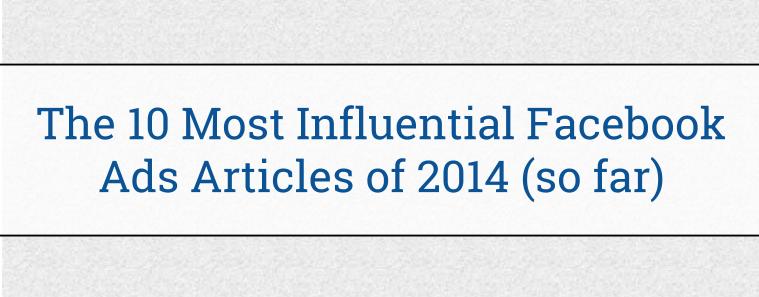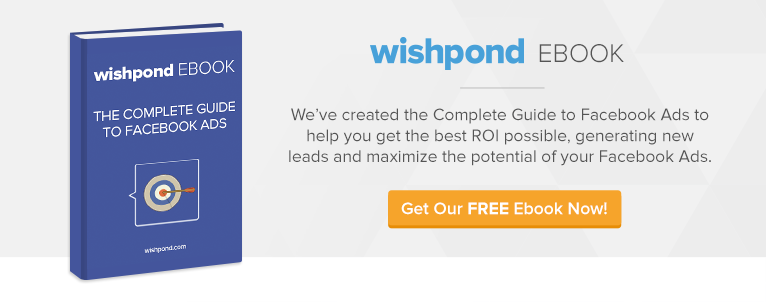
2014 is, for me, the year that Facebook Ads are moving to the mainstream. Part of this change has been Facebook’s pushing us towards it, and part of it through the sheer fact that Facebook Ads work.
In 2014 there have been many amazing articles from around the web that have informed us, confused us, and made us shake our fists.
Here are the 10 most influential Facebook Ads articles of 2014 (in no particular order) that aren’t mine.
#1. Megan Marrs:
45 Fabulous Facebook Advertising Tips & Magic Marketing Tricks
Let’s get rolling with a great starter guide for people wanting to get into Facebook Ads.
You can tell the time and energy Marrs has spent with this comprehensive post. The article also functions chronologically, from getting new advertisers started with deciding their objective and breaking down budgeting, through to targeting, creative best practices, and promoted posts.
While the article doesn’t dive too deep into the intricacies of Facebook Ads, it’s a great place to start for newcomers to the Facebook ad biz.
#2. Brian Carter: Why Every Business Should Spend at Least $1 per Day on Facebook Ads
Published on the Moz blog (so you know it’s good), Brian Carter’s impressive argument for using Facebook Ads to generate brand awareness is an excellent second stop on our adventure.
I love this article for its introduction alone, and find his “Cost to Reach 1000 People” graphic one of the most compelling arguments in favor of Facebook Ads yet published. I’ve recreated it below. What do you think?
Cost to Reach 1000 Impressions (by medium):
I’m sold.
#3. iStrategyLabs: 3 Million Teens Leave Facebook In 3 Years: The 2014 Facebook Demographic Report
This was an article that, rumor has it, inspired President Barack Obama to say “It seems like [they] don’t use Facebook anymore” ( source). Influential indeed.
iStrategyLabs’ report, published only days after the new year, got quite a lot of blood pumping. While the report is only about overall demographics on the platform, it’s information that advertisers need to know more than anyone else.
My own feelings on this article were based around the sensationalist title, something I feel misled a lot of readers. Yes, 3 million teens have left Facebook in 3 years, but what isn’t in the title is that overall growth on Facebook is up 22.6 percent in those same three years. Growth amongst the 55+ demographic is up a shocking 80.4 percent (and that’s the demographic that actually has money).
If anything is going to encourage B2B companies to advertise on Facebook, it’s the knowledge that in the past 3 years, total growth for the 25-55+ year-old demographic has jumped 153%.
#4. Christopher Radcliff: Facebook ads drive 60% increase in sales revenue
Our fourth stop is for some statistics. Don’t you just love math?! Especially when it’s some pretty solid proof that Facebook Ads aren’t a waste of your time, and that they’re getting more effective for business every month.
Featuring stats like “Increased engagement [over the Holiday period] drove click-through rate up 10% quarter-over-quarter (QoQ),” the article breaks down Facebook Ad’s performance (something they only rarely release).
Here’s one of their infographic snapshots of Facebook Ad performance:
These kinds of articles, which keep us up to date when Facebook doesn’t, are incredibly useful for advertisers. We get affirmation, as well as knowledge of how Facebook Ads are impacted upon by seasonal changes – information we can use to strategize our own advertising plan.
#5. Juliette Garside: The Guardian Newspaper and Princeton Researchers John Cannarella and Joshua A. Spechler: Epidemiological Modeling of Online Social Network Dynamics
To be honest, no one really read the Princeton article itself (Garside’s article, on the other hand, has over 15,300 social shares). But it’s likely you know what this is all about: two Princeton researchers published the claim that “Facebook will lose 80% of users by 2017”.
Now, maybe if it wasn’t Princeton we wouldn’t have paid so much attention. But their title (“epidemiological modeling of online social network dynamics” is a bit of a mouthful…) and their pedigree drew more than a few eyes their way.
The article used scientific strategy, determining that:
“Facebook has spread like an infectious disease but we are slowly becoming immune to its attractions, and the platform will be largely abandoned by 2017…”
Cannarella and Spechler made their controversial forecasting by comparing the growth curve of epidemics (smallpox, typhoid fever, etc) to those of online social networks. They concluded that “like bubonic plague, Facebook will eventually die out.”
We all freaked out (advertisers most definitely included), for about three days, until Facebook’s own researchers used the exact same science as Princeton to determine that the ivy-covered halls of that most illustrious of American universities would, also, crumble to the ground by 2017.
Oh. Hmm… Maybe we should take another look at the numbers…
#6. Lauren Blecher: 3 Ways to Boost Your Lead Generation With Social Media
If Marrs’ article give us the introduction, and Carter’s argues for the power of Facebook Ads in brand awareness, Blecher’s article gives us an excellent breakdown of using Facebook Ads in a way few consider.
Lead generation with Facebook Ads is a somewhat more difficult strategy, as it isn’t just a matter of promoting an Ecommerce sale or driving people to check out your website. Lead gen on Facebook requires a serious look into landing pages, entry form optimization, and analytics.
Luckily, Blecher covers all this for us in an article rife with excellent visuals and a step-by-step format to help people get the full picture of how they can generate leads with Facebook Ads.
My highlight for this article is, somewhat ironically, Blecher’s focus on Google Analytics to track the efficacy of your lead generation. She breaks it all down into bite-sized pieces and hands it back to us palatable.
#7. Social Media Examiner (Cindy King): 11 Social Media Marketing Predictions to Watch for in 2014
This was the most read “predictions” article in the field of online marketing and social media. Social Media Examiner’s ‘Marketing Predictions to Watch for” featured 11 of the most successful and influential thought-leaders from around the web. People like Jay Baer, Michael Stelzner, John Haydon, and Ekaterina Walter (if those names don’t mean much to you, that’s fine as well, just trust me that these are individuals of influence).
For advertisers (for me), the remarkable part of this article was that 3 of the 11 said that social advertising was going to be the thing to watch in 2014. Both Jay Baer and Michael Stelzner agreed that paid reach was going to be huge.
This inspired many to reevaluate their online marketing strategy for the year. It let businesses around the world (Social Media Examiner has a readership of over 2 million a month) know that Facebook Ads were going to be big. They were happening and 2014 is the year to get on the bandwagon.
#8. Jon Loomer: Website Custom Audiences: Target Visitors with Facebook Ads (Not FBX!)
Jon Loomer is always one of the first and foremost to come out when something new develops in the Facebook Ads world. It was no different with Website Custom Audiences (or WCA’s).
WCA’s have (or will, if you haven’t seen them yet in Power Editor) changed the way we can target with Facebook Ads. Before WCAs’, ad targeting focused around Interests (which were awesome to increase brand awareness) and custom or lookalike audience (which used our own existing contacts and leads to increase click-through on our Facebook Ads).
Now, however, we can target Facebook Ads at users who have visited our website, but haven’t given us their contact details. Essentially, WCA is free retargeting: FBX without the third party.
Now, you won’t get the expertise or (generally) higher ROI with WCAs than you will with a Facebook Retargeting Ad Partner, but they’re still a very cool development, and Jon Loomer was there to tell us how they worked right from the beginning (as he so often is).
#9. Veritasium: Facebook Fraud Video
Veritasium’s video, outlining the creator’s opinions and findings regarding paid Facebook reach, was one of the single most controversial pieces of content in the Facebook marketing sector since I got into it.
With over 1,600,000 views since its publication on February 10th, this video dives straight into the science of Click Farms and where (if you don’t target your ad well) your Likes might come from.
The creator, a dashing young scientist/videographer, makes some excellent points. For me, I agree with him that Facebook has a bit of a racket going on – taking advantage of uniformed Facebook marketers.
It’s also a very visually appealing and persuasive video. As such, the fact that the entire thing is misleading and sensationalist means the video is at once one of the most influential things to happen to Facebook Ads, and also one of the most dangerous to its viewers.
#10. Jon Loomer: Facebook Fraud Response
Because I promised you I wouldn’t include one of my own articles, I’ll give you Jon Loomer’s response instead. It wasn’t 24 hours before Loomer published his response article, in which he agrees with Veritasium only insofar as to say that the dangers of ClickFarms are real and we should all be careful to target well. I absolutely agree with this, so watch out for Fake Likes!
In his response, Loomer give an excellent breakdown of the main points touched on by the video, before getting into a point by point discussion of where he disagrees with Veritasium and why.
My favorite part of Loomer’s response is (as with all his articles) his basis on numbers. Jon never just states something as fact, backing it up with his considerable reputation for Facebook Ad expertise. Instead, he gives case studies and opens his own history with Facebook Ads wide open – showing people exactly how Facebook Ads can work and backing those assertions up with stats and graphs.
His conclusion, which is the most important point of the whole Fake Likes and Click Farms discussion, is that Facebook Ads require time and energy and knowledge. You can’t simply go barging in willy-nilly expecting an amazing ROI and success for your business on the platform.
If you would like a look at my own response to the Facebook Fraud video (unlike Jon, I get into four specific strategies of how Facebook Ads can be awesome), check out my Veritasium Video Response: Should you Use Facebook Ads to Get Page Likes?
Conclusion
So that’s it, all the way from a great introductory article through some impressive Influencers asserting Facebook Ad dominance, great specific strategies for increasing brand awareness and lead generation, to controversial videos and studies which put us all back on our heels, and the responses that set us back down again.
What were your most influential articles of these first two months of 2014? Let me know in the comments section!
By James Scherer (follow James on Twitter and Google+)
And check out my upcoming webinar on Wednesday, the 5th of March at 9:30 (PST). I’ll be discussing Facebook Ad design best practices, targeting strategies, and taking your questions.

